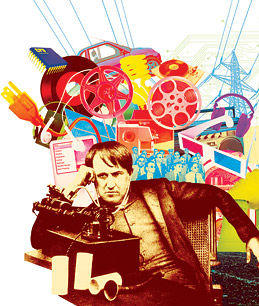
(2 of 2)
It's true that Edison didn't have much formal schooling; it may have amounted to no more than three months. But Edison's mother Nancy, a former teacher, took serious charge of his education at home, where in time he put together a chemistry lab. Edison was also a relentless autodidact, wading through not only the classics in his father's library but also scientific treatises and the science journals that were just taking off in the U.S. Even as a working teenager earning dimes as a railway newsboy on the line between Port Huron and Detroit, Edison was willing to spend the $2 needed to join the Detroit public library — though that was nearly two days' pay.
At age 16 he took a job as an itinerant telegraph operator for Western Union, traveling among the cities of the Midwest on the country's metastasizing railroad lines. By his early 20s he was creating his first inventions: improved forms of telegraph equipment. In time he moved to Boston, where he found himself in a scientific hotbed that would anticipate the geek heaven of Silicon Valley in the 1970s. Amateur telegraphers would trade technological tweaks, competing for new patents, and Edison had the chance to take in public lectures at the new Boston Tech, which would later become the globally influential Massachusetts Institute of Technology.
It was one of Edison's brightest ideas that when he moved seriously into his career as an inventor, in the 1870s, he created his own, smaller-scale version of an inventor community in Menlo Park, N.J. The laboratory and workshop he established there in 1876 — his "invention factory" — put him at the center of a critical mass of assistants with backgrounds in multiple areas of science, engineering and skilled labor. It was essentially America's first industrial R&D facility and the forerunner of every business-world creative cockpit, from the Ford engineering center to the Microsoft campus and Google's Googleplex. At Menlo Park, Edison once boasted, he and his team could develop "a minor invention every 10 days and a big thing every six months or so." That's a rate even Steve Jobs would kill for.
It's ironic that nowhere is America's position in science and technology more threatened than in the industry that Edison essentially invented: energy. Clean power could be to the 21st century what aeronautics and the computer were to the 20th, but the U.S. is already falling behind. China, South Korea and Japan are set to invest more than $500 billion combined in clean technology over the next five years, while the U.S. is likely to invest less than $200 billion — and that's assuming clean-energy legislation makes it into law. Meanwhile, Congress remains largely paralyzed. Though in May the House of Representatives was finally able to pass the $86 billion America Competes Reauthorization Act, which would double the budgets of the National Science Foundation (NSF) and Energy Department's Office of Science, the bill's fate is cloudy in the deadlocked Senate. "At this rate...we'll be buying most of our wind generators and photovoltaic panels from China," former NSF head Arden L. Bement said at a congressional hearing recently. "That's what keeps me awake sometimes at night."
He's not the only one. In mid-June, a group of corporate titans, including Microsoft co-founder Bill Gates and GE CEO Jeffrey Immelt, descended on Washington to call for U.S. spending on energy research to be tripled. They noted that the government today spends less than $5 billion a year on energy research and development — not counting temporary stimulus projects — compared with $30 billion annually on health research and more than $80 billion on military R&D. At a time when energy is more important than ever — and while oil from a blown well bleeds into the Gulf of Mexico — the U.S. no longer seems willing to create the environment that can engender the innovation we were once known for. "The world is not going to wait for the United States to lead," said Immelt. "This is about innovation. This is about competition. This is about energy security."
Some erosion of the U.S.'s scientific dominance is inevitable in a globalized world and might not even be a bad thing. Tomorrow's innovators could arise in Shanghai or Seoul or Bangalore. And Edison would counsel against panic — as he put it once, "Whatever setbacks America has encountered, it has always emerged as a stronger and more prosperous nation." But the U.S. will inevitably decline unless we invest in the education and research necessary to maintain the American edge. The next generation of Edisons could be waiting. But unless we move quickly, they won't have the tools they need to thrive.